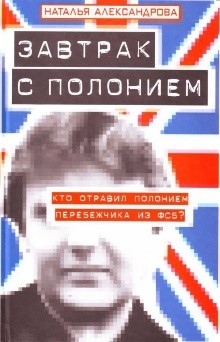
Best-selling Russian author Natalya Aleksandrova published a thriller in 2007 with the none too subtle title Завтрак с полонием — which translates as Polonium for Breakfast.
It has a picture of Alexander Litvinenko on the cover, with the British flag in the backgound.
This short post is not a review of Polonium for Breakfast —that lies outside the scope of Russiainfiction.com, which is a blog looking at English language novels with a Russian theme or setting (as this post sets out in more detail).
But I will just give a little insight into the novel’s set-up. Its subtitle is ‘who poisoned the FSB defector with polonium?’. Its premise is that Russia’s president, on hearing of the poisoning with polonium of a former Russian security service (FSB) man in London, assigns the novel’s hero, Pavel, to find out who was responsible.
The book opens in the President’s office in the Kremlin.
The president lifted the receiver of the internal phone and barked:
– Send Patrushev to me.
Zavtrak c poloniem, Natalya Aleksandrova, 2007, p.5
In comes General Patrushev, the Director of the FSB. The President asks him what he knows about the poisoning of the defector in London. Patrushev replies
If you want to know whether my Service has anything to do with these events, the answer is negative. It’s nothing to do with us.
Zavtrak c poloniem, Natalya Aleksandrova, 2007, p.6
And so the novel is set up for three hundred pages or so of fairly conventional thriller, where Pavel uncovers the story behind the poisoning of the fictional character ‘former FSB officer Aleksei Litovchenko, defector’ (p. 22), friend of ‘Borzovsky’ (p. 5).
Natalya Aleksandrova is happy to use FSB Director Patrushev’s real name in the novel, but other key characters’ names are changed, although they are not far from —in the case of Litovchenko and his oligarch friend Borzovsky— Litvinenko and Berezovsky.
And the details of the murder are in line with the Litvinenko case. Her character Litovchenko ‘fled to Great Britain in 2000 and received British citizenship … he died on 23rd November in University College Hospital, London’ … on 1st November ‘he had two meetings – in the Japanese sushi bar Itsu and in the bar of the Millennium Hotel’ (Zavtrak s poloniem, p. 8).